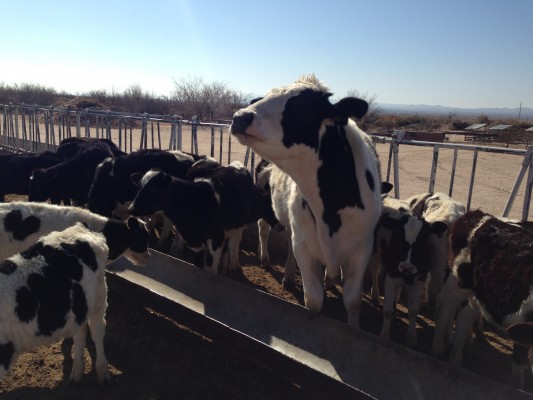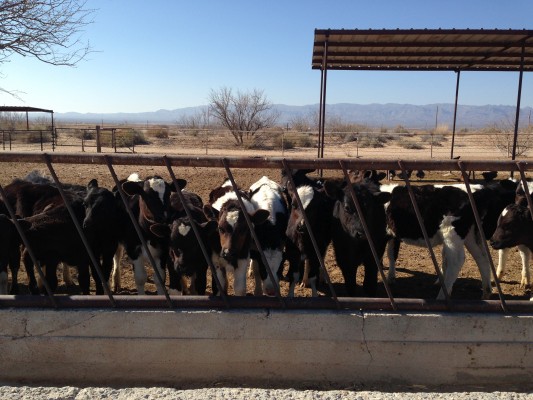EL PASO — As the sun rises over the desert landscape, the rushing hooves of a herd of 80 calves creates a dust storm as they rush to their morning feast of gourmet quality hay bales.
The calves and cows at Licon Dairy are the VIPs of the dairy industry in the greater El Paso area. Licon Dairy does things differently than other local factory farm competitors such as Price’s Creameries. Licon raises organic livestock — no hormones, no antibiotics, no mysterious injections for these happy and healthy bovines.
A Holstein-Friesian dairy cow at the Licon Dairy Farm. The farm raises organic livestock only— no hormones, no antibiotics. Photo credit: Rebecca Grant
“You have to give them the best quality of hay to keep them healthy,” said Angel Licon of the Licon Dairy family, “We start them off healthy by leaving the calves with their mothers to feed and get all of the nutrients from their milk. They don’t do that at factory farms.”
The steers that Licon dairy produces are auctioned off either locally or in Amarillo, TX. Because the steers are organically raised, they have a higher value. Since the popularity of organic products is growing, this type of livestock is in high demand.
“They want to produce milk in massive quantities to make more money and giving the cows growth hormones and antibiotics regularly does that,” said Licon, “It’s bad because they take the calves away from their mothers as soon as they are born and they have all the cows pretty much on top of one another.”
Licon said that it is actually cheaper to not use hormones and antibiotics but because of the desire to produce in mass quantities, these companies continue to use them, regardless of the effect on human health and the environment.
A group of calves eagerly await for their breakfast. Photo credit: Rebecca Grant
Licon Dairy is proof that it is possible to raise livestock organically and that it is cheaper to do so. “It is only necessary to use antibiotics when they are sick,” Licon pointed out. The larger factory farms in the El Paso area have facilities with 5,000 plus animals whereas farms like Licon Dairy only have about 120 at most.
At factory farms the feed that is used is a low-grade commercial feed with some mystery components, including “bakery or grocery by-products,” which is listed on the “Milk Story” section of the Price’s Creameries website. “Our milk is not organic but we do have sister companies who make organic milk,” said Irene Pistella, public relations director for Price’s Creameries.
But organic products do cost more at the store. Sarah Whitten, a 27-year-old mother of three from northeast El Paso explained that she is not able get all the groceries she needs if she buys organic products.
“I would love to feed my kids only organic products and organic milk but I just can’t afford it. I have too many mouths to feed,” she said. She was aware of the use of antibiotics and hormones in her milk, but she said she just cannot afford to change her shopping habits. Unfortunately, this is the case for many in El Paso.
“I pay the extra money to get what I know are the best quality products” said Christina O’Hara when asked why she buys organic products. O’Hara is a 29-year old single mother with one child in northeast El Paso. She chooses to spend the extra money because she knows the health benefits of an organic lifestyle are worth it, “I like to buy these products because I know they are safe and healthy for my daughter and myself.”
The main reason that people cannot live an organic lifestyle is because of the price difference. For example, at Big 8 chain food stores, consumers can purchase two gallons of Lowe’s brand whole milk for five dollars. Right next to these bargain-priced gallons are half gallons of Horizon organic whole milk priced at $3.99.
Essentially, consumers have the choice, quite literally in front of them, between getting the most “BANG” for their buck and paying the same price for only a fourth of the healthy alternative.

